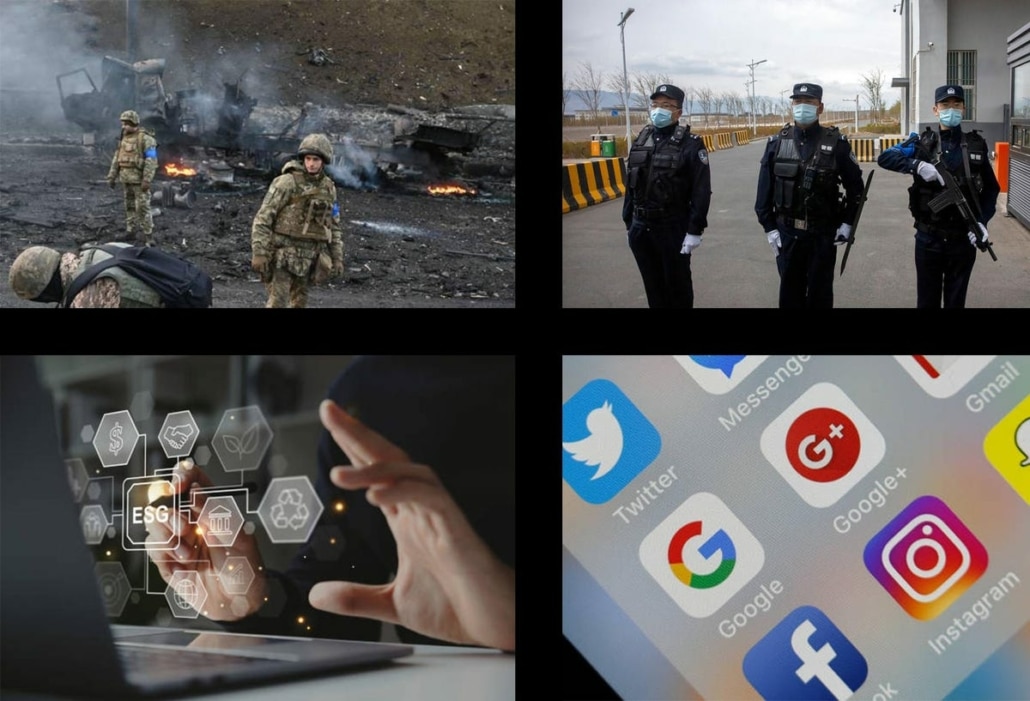Business and Human Rights: Key Challenges for 2023

In the United States and worldwide, events in the last year have eroded protections of human rights, creating greater responsibilities for leading global companies. Here are four areas relating to human rights that corporate leaders will need to focus on in 2023.
Russia’s continued brutality in Ukraine
Russia’s invasion of Ukraine in February has had devastating consequences. Tens of thousands of Ukrainian and Russian soldiers and thousands more Ukrainian civilians have died. The war has created the largest refugee crisis in Europe since World War II with more than seven million refugees fleeing the country and another eight million internally displaced.
The war prompted more than 1,000 global companies to stop doing business in Russia. Some pulled out permanently while others suspended operations, hoping to return to Russia after the conflict has been resolved.
Two things have become clear. Companies that harbored the hope of quickly resuming their pre-war operations must now assume a much longer time horizon and adjust their business plans accordingly. Second, there is a need for those assessing corporate actions to better differentiate between companies contributing, even indirectly, to Putin’s war effort, like Bharat Petroleum from India or Titan Industries from the U.S. which makes tires and other automotive products that have military use, and those that are providing for the basic human needs of Russian people, like the healthcare providers Zimmer Biomet or Kemin, both based in the U.S. The aim of restrictions on corporate actions should be to punish the war effort, not the well-being of the Russian people.
China’s mass persecution of the Uyghurs
Xi Jinping was selected by the Central Committee of the Communist Party for a third five-year term as China’s political leader in October. The most powerful Chinese leader since Mao Zedong, Xi has consolidated his power and that of the Communist Party, expanding state control over every aspect of society and the economy.
Xi’s authoritarianism has hit hardest in Xinjiang province, where the government has detained more than one million Uyghurs, a Turkic Muslim minority. Forced labor of Uyghurs and other Turkic minority populations is widespread in factories and agricultural operations in Xinjiang. In response, the U.S. Congress overwhelmingly passed the Uyghur Forced Labor Prevention Act, which became law in June. It prohibits the import into the U.S. of any products with parts from Xinjiang. This law has had an immediate effect on apparel using Xinjiang cotton, (about 80% of Chinese cotton is from Xinjiang) and solar panels, almost all of which include polysilicon ingots and wafers coming from Xinjiang.
The rapid deterioration of human rights in Xinjiang, and the crackdown on democratic institutions in Hong Kong, put global businesses in the hot seat. China accounts for close to 40 percent of the world’s manufacturing, with the U.S. a distant second at 23 percent. China also is the second-largest consumer market in the world, behind only the U.S. Its massive economy offers alluring prospects for Western investment firms. These economic opportunities make it very hard for companies to walk away from China. Yet the deteriorating human rights situation, Xi Jinping’s increasing support for Russia’s war effort, and his confrontational rhetoric have all made it tougher for companies to do business in China in a manner that comports with their commitments to corporate responsibility.
At a minimum, corporate leaders should not follow hedge fund mogul Ray Dalio’s example of excusing aspects of the Chinese government’s autocratic rule. When asked about doing business in China in light of the serious human rights abuses last year, Dalio, the founder of Bridgewater Associates, described China as “a top-down country” that “behave[s] like a strict parent.” Asserting a false equivalence, he asked, “Should I not invest in the United States because of our own human rights issues?” When he was lambasted for making these comments by The Wall Street Journal and others, Dalio said that he had “sloppily answered” the question put to him, which “created a misunderstanding.”
Political disinformation on social media platforms continues to be a threat to democracy
In the U.S. and a number of other countries, the continued prevalence of disinformation and other harmful content online continues to exacerbate polarization and undermine democratic discourse. Several events in the last year have made things worse. Most troubling was Elon Musk’s purchase of Twitter. In his first few months at the helm, he has appeared determined to ruin the company as a commercial enterprise while inviting right-wing extremists of various stripes to return to the struggling platform to spread hate and misinformation. Musk has ushered back thousands of other previously banned Twitter users, including election deniers, anti-vaccination conspiracy theorists, and QAnon adherents who still claim that Donald Trump won reelection in 2020. Musk’s mass layoffs, including teams of content moderators, have scared off many of the corporate advertisers that provide the lion’s share of the company’s revenues. Most recently, he suspended the Twitter accounts of a group of journalists who have written about the company, apparently in a way that displeased the owner.
Subscribe to the Ethical Systems newsletter
Meanwhile, Chinese-owned TikTok has done little to reassure skeptics who fear that it takes orders from Beijing and constitutes a threat to users’ privacy and possibly U.S. national security. Reporting by The New York Times and others has suggested that TikTok’s chief executive, a Singaporian finance specialist, doesn’t set content policy for the company. TikTok has not succeeded in quieting anxietythat its corporate parent, ByteDance, is in charge of the U.S.-based platform and may be using it to surveil users’ accounts. In October, Democratic members of Congress cited research by our Center when they demanded that TikTok clarify its policies and enforcement practices related to the spread of misinformation on the platform. These concerns haven’t slowed TikTok’s epic growth among young users, which has outstripped the pace of expansion of Facebook, Instagram, and YouTube in their early years.
Online gaming sites are also now venues for harmful content. The 18-year-old man who murdered ten people in Buffalo in May kept a detailed account of his plans on Discord, a social media app popular among gamers. Most gaming companies are far behind the major social media companies in moderating communications on their platforms. The gaming industry, which generates more revenue than the music and movie industries combined, needs to step up its effort to address extremist abuse of its products.
The debate about ESG investing intensifies
The last year also has witnessed unprecedented attacks on asset-management firms that assess the environmental and social impacts of companies in which they invest. These efforts have grown considerably in recent years through the so-called environment, social, and governance (ESG) frameworks, which now account for more than $35 trillion in assets under management. A number of conservative pundits and politicians are condemning the legitimacy of ESG measures, charging that any consideration of the environmental or social impact of companies is a form of “woke capitalism.”
Florida Governor Ron DeSantis recently withdrew state pension funds from BlackRock because of the firm’s ESG offerings, one of several state officials to do so. It boggles the mind to view BlackRock CEO Larry Fink as a “woke capitalist.” Others, including our Center, have voiced concerns that most existing ESG funds are primarily driven by marketing concerns, not principles. In rebuilding ESG, the investment sector needs to gather more significant data and put more emphasis on social issues such as worker well-being in global supply chains. There is little doubt that ESG investing will continue to be a contentious subject in 2023. To nay-sayers like DeSantis ESG is simply the latest battleground in their ideological campaign again climate and human rights activists, especially those who say that ESG will not be meaningful until there is better data, clearer standards, and more ambitious systems to measure the actual performance of companies.
Michael Posner is the Jerome Kohlberg professor of ethics and finance at NYU Stern School of Business and director of the Center for Business and Human Rights. Follow him on Twitter @mikehposner.
Lead image: Getty Images + Associated Press
Reprinted with permission from Forbes.








